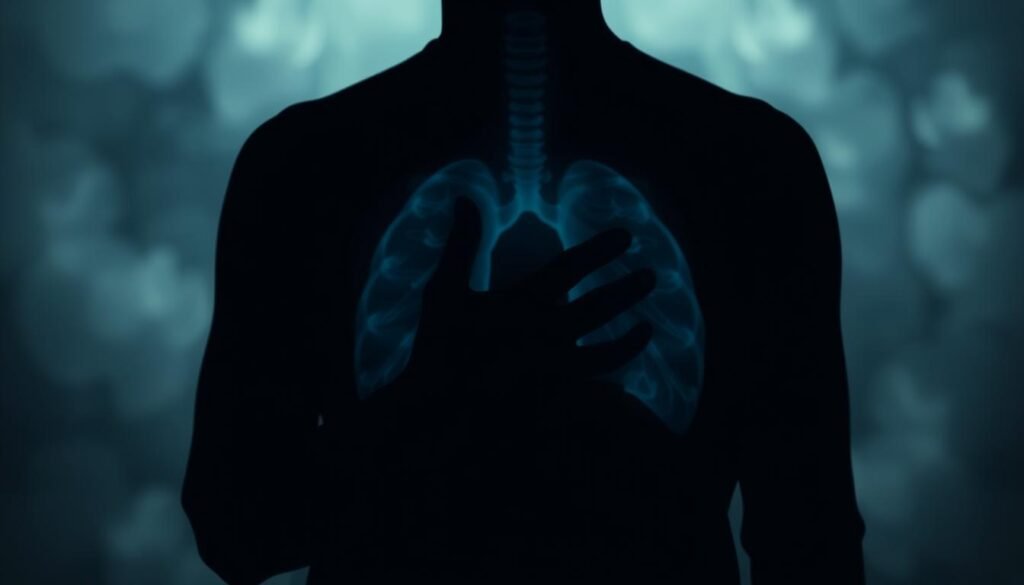Did you know that nearly a quarter of people with lung cancer have breathing problems that seem like other illnesses? These hidden signs are crucial to notice because they might trick you into thinking it’s something less serious. If not recognized early, it could mean finding out about the cancer too late, which impacts how well treatments might work and survival chances.
Here, we’ll highlight the major symptoms of lung cancer that are easy to miss. Look out for signs such as a lasting cough, losing weight without trying, and constant chest pain. These symptoms are serious and could mean lung cancer. Catching these signs early can make a huge difference in recovery. For a deeper look at these symptoms, check out this guide.
Key Takeaways
- Silent signs of lung cancer can easily be overlooked, often resembling common illnesses.
- Chronic cough or unexplained weight loss may signify a serious underlying issue.
- Persistent chest pain that doesn’t resolve could be an indicator of lung cancer.
- Recognizing early symptoms can significantly improve treatment outcomes.
- Frequent respiratory infections can point to a developing lung issue.
- It’s crucial to consult a healthcare provider if experiencing concerning symptoms.
Understanding Lung Cancer
Lung cancer affects thousands every year. This lung cancer overview focuses on causes and key risk factors. Smoking is the leading cause. It is responsible for most lung cancer deaths among women and men.
Other causes of lung cancer include radon gas and secondhand smoke. These can harm even non-smokers. Being around secondhand smoke raises your lung cancer risk by 20-30%.
Most people who get lung cancer are older; very few are under 35. Smoking heavily increases men’s risk of lung cancer. Woman smokers also face a higher risk than those who don’t smoke.
Finding lung cancer early is crucial. It helps doctors treat it more effectively. Knowing the risks helps with early detection. It encourages people to get checked if they have worrying symptoms.
| Risk Factor | Impact on Lung Cancer Risk |
|---|---|
| Smoking | 80% of deaths in women, 90% in men |
| Secondhand Smoke | 20-30% increased risk for non-smokers |
| Age | Less than 2% of patients under 35 |
| Gender | Men are 23 times, women 13 times more likely when smoking |
What Are the Silent Signs of Lung Cancer?
Knowing the silent signs of lung cancer is key for catching it early. These signs are often soft and easy to ignore. Spotting them early can help start treatment sooner.
Definition of Silent Signs
Silent signs of lung cancer may be weak or mimic other conditions. They include:
- Chronic cough that persists over time
- Fatigue that doesn’t improve with rest
- Shortness of breath during routine activities
- Changes in voice, such as hoarseness
- Unexplained weight loss
- Chest pain, especially if persistent
Importance of Early Detection
Early detection of lung cancer can change treatment success and survival. Catching silent signs quickly may mean more effective treatment options. Symptoms typically grow stronger as the cancer does, making treatment harder. Knowing these early signs helps at-risk people see a doctor early.
| Silent Signs | Description | Possible Impact |
|---|---|---|
| Chronic Cough | A persistent cough that doesn’t go away | May interfere with daily activities, often dismissed as allergies |
| Fatigue | Excessive tiredness not alleviated by sleep | Can reduce quality of life and hinder regular routines |
| Changes in Voice | Hoarseness or voice changes without a clear cause | May indicate underlying issues in the lungs |
| Unexplained Weight Loss | Significant weight loss without dieting | Potential sign of cancer progression impacting appetite |
Chronic Cough: An Overlooked Symptom
A chronic cough can signal serious health problems, like lung cancer. Every year in the U.S., over 30 million people see doctors for a lasting cough. It’s key to note that a cough lasting more than two weeks could be a lung cancer sign. Around 57 percent of folks with lung cancer report coughing, showing how important this symptom is.
People often go to the doctor because of a continuous cough. Yet, studies show under two percent of these patients have lung cancer. This might make some feel too safe and ignore their symptoms. It’s still crucial to talk to a doctor if you’re coughing and also losing weight or feel very tired. These can also be lung cancer signs.
Many things other than lung cancer can cause a chronic cough. This includes postnasal drip, asthma, and chronic obstructive pulmonary disease (COPD). Even so, a cough that won’t go away should not be ignored. Getting checked regularly and knowing the risks, like smoking and being around asbestos, helps catch problems early.
Coughing Up Blood: A Critical Sign
Coughing up blood is a serious warning of possible health issues. It is known medically as hemoptysis. It’s critical not to ignore this sign, as it could point to severe conditions needing medical review. Conditions like lung infections, issues with the lungs’ blood vessels, or even cancer could be the cause. Knowing why this happens shows why good healthcare is crucial.
Possible Causes of Hemoptysis
Coughing up blood can happen for many reasons. Here are a few common ones:
- Lung infections: Pneumonia and other lung issues can cause hemoptysis. This is due to inflammation and damage in the lungs.
- Blood vessel abnormalities: Problems like pulmonary embolism can interrupt blood flow, leading to bleeding.
- Malignancies: Lung cancer often shows itself through symptoms like coughing up blood. This requires quick medical care.
When someone coughs up blood, it’s important to tell a doctor right away. This helps doctors figure out the problem quickly.
When to Seek Medical Attention
If you’re coughing up blood, get medical help immediately. Fast action leads to the right tests and treatments, possibly saving lives. Not getting help could delay treatment for something serious. Talk to a doctor, especially if coughing, breathing trouble, weight loss, or chest pain also bothers you.
- Persistent coughing or sputum production
- Shortness of breath or wheezing
- Unexplained weight loss
- Chronic chest pain
Being aware and seeking help early makes a big difference in your health. If you’re worried about coughing up blood, look for information on early disease detection and care. For more on lung cancer symptoms, check out this resource.

Unexplained Weight Loss: More Than Just Diet
Unexplained weight loss can be a key sign of hidden health problems, like lung cancer. People may find they’re losing weight even though they haven’t changed their diet or lifestyle. This could mean the body is fighting a disease, and spotting this early can help catch serious issues.
Understanding Unintentional Weight Loss
Unexplained weight loss isn’t just about looks; it’s a serious sign of health problems, including various cancers such as lung cancer. The American Cancer Society says major weight loss is often the first obvious sign of lung cancer. This comes with other symptoms like losing your appetite and feeling very tired. If someone loses more than 5% of their body weight in 6 to 12 months without trying, they should see a doctor.
Weight loss and lung cancer can happen for several reasons:
- Cancer can cause metabolic changes.
- A tumor might press on organs and reduce appetite.
- Long-term infections or other health issues can affect organs.
- Mental health problems, like depression and anxiety, can also play a role.
Weight loss can show up at any cancer stage, not just one particular kind. Other conditions such as COPD, heart failure, and stomach problems can cause significant weight loss too. It’s crucial to get a full health check, including blood tests like CBC and CRP, to find any hidden issues. By understanding the connection between unexplained weight loss and lung cancer, people can take steps to protect their health early on.
Persistent Chest Pain: Not Just a Heart Issue
Persistent chest pain might make you think of heart problems, but it can also mean lung cancer. Knowing the kind of chest pain is key to getting the right diagnosis and treatment.
How Chest Pain Relates to Lung Cancer
Lung cancer symptoms can include chest pain that gets worse with deep breaths or coughing. This pain can happen when a tumor presses on nerves or other parts in the chest. Other lung issues like pneumonia or bronchitis can cause similar pain. It’s important to see a doctor if you have chest pain that doesn’t go away.
Differences in Chest Pain Types
Chest pain comes in different types, showing various health problems. Knowing these differences helps tell apart heart issues from lung problems. Below is a table showing different chest pain types:
| Type of Chest Pain | Description | Associated Conditions |
|---|---|---|
| Sharp Pain | Sudden and intense pain that may worsen with breathing or movement. | Lung cancer, Pneumonia, Pulmonary embolism |
| Dull Discomfort | A persistent aching or pressure that does not change with movement. | Heartburn, Lung cancer |
| Burning Sensation | A sensation similar to heartburn that can feel like tightness. | GERD, Acid reflux |
| Localized Tenderness | Pain that is sensitive to touch or pressure in a specific area. | Costochondritis, Musculoskeletal injuries |
| Radiating Pain | Pain that spreads to the shoulders, arms, or back. | Heart attack, Aortic dissection |

Knowing the different chest pains can help in getting a quick checkup. It makes it easier to figure out if it’s lung cancer or something else. Not checking chest pain with a doctor can lead to big problems, so getting a proper diagnosis is vital.
Hoarseness in Voice: A Clue to Lung Issues
Hoarseness can seem like a minor issue, but it’s more important. It could be telling us something about our health. In fact, if your voice stays raspy or strained, it might hint at lung cancer. This change in how we sound can come with other symptoms. So, we should not ignore it.
If your voice has been odd for more than a few weeks, pay attention. This, along with a long-lasting cough, trouble swallowing, or losing weight without trying, is concerning. These signs suggest seeing a doctor is crucial.
Getting advice from a doctor early can mean better chances in fighting diseases. So, if your voice doesn’t sound right and it’s been a while, it might point to something serious. It’s key to keep an eye on our vocal health.
| Symptom | Possible Connection |
|---|---|
| Persistent Hoarseness | Could indicate throat or lung issues, including lung cancer. |
| Voice Changes | May signal irritation or obstruction in the respiratory tract. |
| Chronic Cough | Commonly associated with lung cancer; merits investigation if combined with voice changes. |
| Difficulties in Swallowing | Can suggest potential tumors affecting the throat or lungs. |
| Unexplained Weight Loss | Often a silent symptom of lung cancer, occurring in nearly half of cancer patients. |
Shortness of Breath: Beyond Physical Exertion
Feeling out of breath can worry you, especially if it comes on without any hard work. This issue might not just make everyday tasks hard but could also be a sign of something serious, like lung cancer. It’s important to know about different problems that could make you feel short of breath so you can get help early.
Conditions That Cause Shortness of Breath
Many things can make you feel like you can’t breathe well. Here are some common reasons:
- Airway obstruction due to asthma or chronic obstructive pulmonary disease (COPD)
- Pneumonia, which can cause inflammation and fluid buildup in the lungs
- Heart conditions that affect blood flow and lung function
- Pulmonary embolism, where a blood clot travels to the lungs
- Advanced lung cancer, which can cause complications like fluid buildup and tumor obstruction
If you’re having trouble breathing and don’t know why, see a doctor quickly. They might do tests, like X-rays or CT scans, to find the cause. Knowing how being short of breath links to lung cancer is very important. For more info, check out this resource.

Frequent Lung Infections: A Red Flag
Frequent lung infections like pneumonia or bronchitis show underlying health issues. People often miss these signs, not knowing they point to serious lung problems. Seeing a healthcare professional for a full check-up is a smart move if you get these infections a lot.
Repeated lung infections could mean you have lung cancer or another condition. Over 11 million Americans have COPD, which can cause these infections. Many don’t know they have it, so finding it early is key to managing it well.
- Frequent lung infections may lead to increased risk of complications.
- People aged 40 or older, especially smokers or former smokers, have a higher risk of COPD and related infections.
- Interestingly, 1 in 4 people with COPD have never smoked.
As COPD gets worse, symptoms and infections become more frequent. Knowing this helps you watch for changes in your lung health. It’s important to take any strange symptoms seriously. For advice on spotting early lung cancer signs, check out early warning signs of lung cancer. Staying ahead with health checks can uncover and treat lung problems early.
Fatigue: Listening to Your Body
Fatigue can be a red flag, especially with lung cancer. If you’re always tired and rest doesn’t help, it might be serious. People with lung cancer experience a type of tiredness that’s more than just being sleepy. It’s linked to the fatigue that comes with cancer. Knowing about this fatigue helps you pay attention to what your body is saying. This could lead to getting help early.
Understanding Cancer-Related Fatigue
Cancer-related fatigue is more intense than normal tiredness. It’s a deep exhaustion that doesn’t get better with sleep. For those with lung cancer, it feels like they’re always tired. This isn’t just about physical feelings. Emotional and mental stress play a big part. It’s important to recognize this fatigue. This way, symptoms can be managed sooner, even if the diagnosis comes late.
Differentiating Fatigue Types
Knowing the difference between types of fatigue is key. It helps to figure out when it might be something like lung cancer. The main types are:
- Normal Fatigue: It’s short-term and gets better with rest.
- Cancer-Related Fatigue: It’s constant and rest doesn’t really help.
- Emotional Fatigue: It comes from stress and emotional pressure.
If you have lung cancer, telling these fatigues apart is crucial. It helps you talk to doctors and get the right help. This way, you can tackle any problems and feel better overall.
Conclusion
Understanding lung cancer’s silent signs is key to protecting your health. Symptoms like a continuous cough, unexpected weight loss, and breathing difficulties are important. They might look harmless but could signal bigger health issues.
Early symptom detection is crucial for better treatment results. It matters because even people who don’t smoke can get lung cancer. This shows why everyone should be aware.
Every year, nearly 140,000 people in the U.S. die from lung cancer. This shows how serious the disease is. High-risk individuals get screenings as part of their standard care. Early detection saves lives, making it crucial to take charge of your health.
A team approach is vital in treating lung cancer. Surgeons, medical oncologists, and radiation oncologists work together. This team strategy helps manage the cancer, whether it’s in early stages or advanced.
Encourage health awareness in yourself and others. This can lead to early treatment and save lives. By knowing lung cancer’s quiet signs and seeking medical advice, you make smart health decisions. Being watchful and taking action early are the best defenses against this widespread, deadly illness.